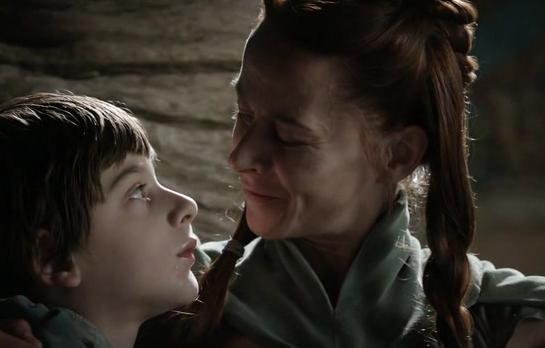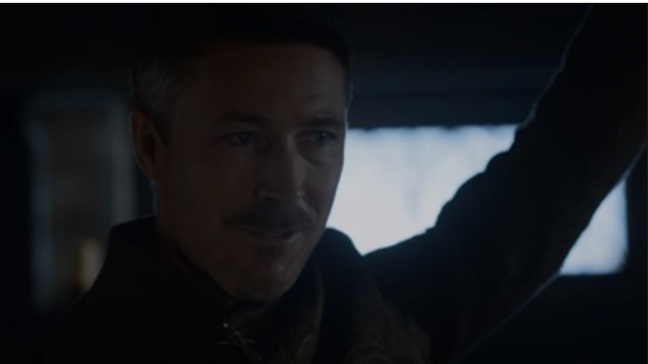“The Laws of Gods and Men” very succinctly showed us two sides of Daenerys: the benevolent ruler doing her best to serve her people, and the unforgiving tyrant. While Daenerys was never exactly soft-willed, this tyrannical side has been coming to the front more and more throughout Season 4.
I’m starting to worry about Daenerys as a ruler, as I’m sure everyone else is, too, because of lines like, “I will answer injustice with justice,” “They can live in my new world or they can die in their old one,” and all the other ones they put in the Season 4 trailers.
This presentation of Daenerys differs considerably from what we’ve seen of her before. Compare the scene after she conquers Meereen to the one after she conquers Yunkai: In Meereen, a huge black Targaryen flag covers the statue of the Harpy, while in Yunkai she goes out among the people and is lifted up by them. In Yunkai, we only see the slaves’ reaction and how Daenerys deals with them; in Meereen, we see how Daenerys deals with the masters.
Here we see her surveying her empire, instead of being hoisted up on the shoulders of her people.
Like I mentioned in my review of “Oathkeeper,” when I read the books, I thought Daenerys crucifying the masters of Meereen was pretty badass. One for every crucified slave child they posted on her way? Now that’s some symbolic justice she’s meting out. When I was reading, I thought that was pretty cool.
In the show, the crucifixion was horrifying, and it was presented that way on purpose – Barristan’s counsel against this plan presented an alternative before we even knew what she was going to do, and this conversation is followed by some pretty gruesome crucifying.
Although there is probably no non-gruesome way to crucify someone.
Again, compare this to Daenerys in Season 3: we didn’t see her deal with the Yunkai’i masters, but we did see her wreak some havoc in Astapor. The Unsullied killed all the masters in the city, and Daenerys got Drogon to light a dude on fire. That whole scene was definitely presented as badass, though, not terrifying. Part of it for me was definitely that Kraznys mo Nakloz (the aforementioned dude who gets set on fire) was talking about Daenerys in a sexist and derogatory way to Missandei, so Daenerys getting the better of him was incredibly satisfying.
Daenerys’ interaction with the Meereenese masters was faceless the entire time: there was no personal interaction between any of them. They crucified slave children, and she crucified them, without any sneaky plots or secretly speaking the same language, or any interaction, period.
Not a great way to introduce yourself.
And that brings us back to the two sides of Daenerys in “The Laws of Gods and Men.” Her interaction with the goatherd is the same Daenerys from Season 1-3: she gracefully accepts responsibility and rectifies the problem, and then is incredibly pleased to see the man’s gratitude and quirky exit.
When Hizdahr zo Loraq enters the room, her demeanor changes completely: where she was laughing happily when the goatherd left, she’s now saying rude things in a sarcastic tone. Daenerys isn’t necessarily interested in the fact that slavery is a societal system of oppression: any individual who wasn’t actively fighting against it was propagating it, and is therefore a bad guy in her books.
This goes back to a longstanding argument about sexism and racism in society. You read Lincoln’s speeches, say, and it turns out that they’re super racist. Then you try to make yourself feel better (or someone else comes to Lincoln’s rescue) by saying that it was a different time. Everyone was racist, so why not Lincoln?
This argument doesn’t fly with Daenerys. Of course, it’s awkward when Hizdahr reveals that his father argued against the crucifixions and was overruled, but she doesn’t outright apologize for the death of Loraq Senior.
The choices the show has been making this season have indicated the beginning of an arc for Daenerys, one where she’s at least flirting with tyranny. As she learns from Hizdahr (and will hopefully remember), making broad generalizations about groups of people, even if they’re slave masters, wrongs the individual. Giving permission in the end for Hizdahr to bury his father at least indicates that the road to tyranny will be a windy one, if that’s the road she’s on.
















